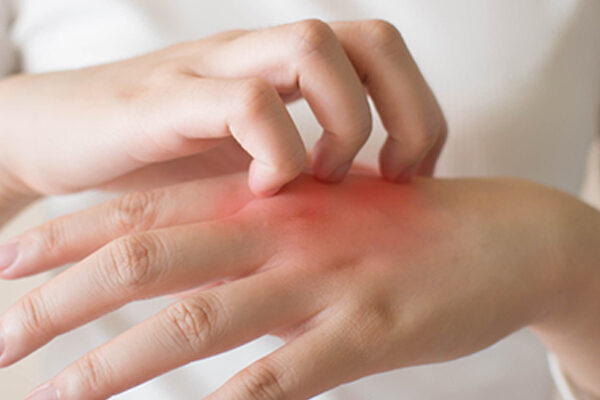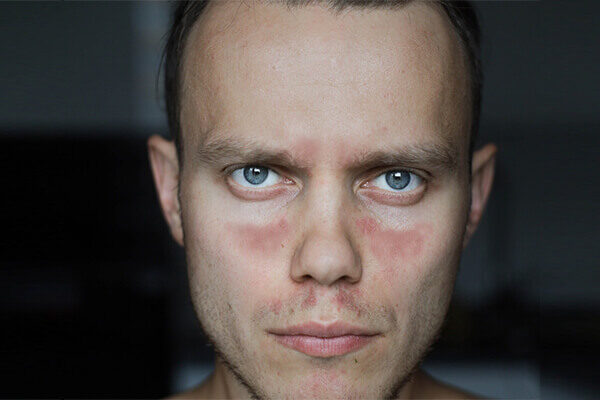
Skin conditions can often present similar symptoms, making it challenging to differentiate between them. Dermatitis herpetiformis and eczema are two such dermatological conditions that can cause itching, discomfort, and confusion to those affected.
Amidst the quest for better management of skin conditions, Revival Research Institute is conducting various dermatological clinical trials, including atopic dermatitis clinical trials to explore innovative treatments and therapeutic approaches to help people deal with skin conditions.
In this blog, we’ll delve into the characteristics of dermatitis herpetiformis vs eczema, highlighting their differences and similarities to provide clarity on managing these conditions effectively.
Understanding Dermatitis Herpetiformis
Dermatitis herpetiformis is a chronic autoimmune skin condition known to cause intense itches and blistering skin lesions. Dermatitis herpetiformis is known to occur in people with celiac disease, an autoimmune condition where the immune system mistakenly attacks the skin in response to gluten consumption. This results in the formation of itchy, red bumps and blisters on the skin, typically found on the elbows, knees, buttocks, and back. It is known to affect 10% of the people suffering from celiac disease.
What is Eczema?
Eczema is a chronic inflammatory condition that causes your skin to become dry, itchy, swollen and cracked. It is believed to be caused by a combination of genetic and environmental factors, with triggers including irritants, allergens, climate, and stress. Eczema can affect people of all ages, from infants to adults, and is often accompanied by other allergic conditions such as asthma and hay fever.
Also read: Is Eczema An Autoimmune Disease or Something Else?
Dermatitis Herpetiformis vs Eczema: Characteristic Features
| Dermatitis Herpetiformis | Eczema |
|---|---|
| Small clusters of red bumps. | Dry, sensitive skin prone to itching. |
| Intense itching and burning sensations. | Itchy, inflamed skin with redness and scaling. |
| Appears on the elbows, knees, buttocks, back, or scalp. | Appears on the hands, feet, face, neck, and knees. |
| Rash is symmetrically distributed. | Skin becomes thick and leathery. |
| The rash comes and goes in cycles with periods of remission and flare-ups. | Skin appears red or brownish gray in color. |
Dermatitis Herpetiformis

Eczema

Dermatitis Herpetiformis vs Eczema: The Different Causes
Dermatitis Herpetiformis
The causes of dermatitis herpetiformis include:
- Gluten in Food: Dermatitis herpetiformis is often associated with celiac disease, an auto immune disorder triggered by gluten consumption. When individuals having celiac disease consume gluten-containing foods, their intestines produce an antibody. This antibody enters the bloodstream and accumulates in the blood vessels beneath the skin, leading to the onset of the dermatitis herpetiformis rash.
- Genetics: Genes are believed to play a significant factor in the onset of dermatitis herpetiformis. Specific genetic mutations have been identified that interfere with the body’s ability to properly digest gluten. Consequently, this difficulty in gluten digestion leads to the development of dermatitis herpetiformis.
Eczema
Eczema is caused by a combination of genetic and environmental factors such as:
- Specific genetic mutation
- Reduced production of skin barrier proteins
- Substances like pollen and animal fur that trigger allergic reactions
- Exposure to certain chemicals and irritants, such as those found in soaps
- Elevated levels of humidity
- Increased temperatures
Also read: All You Need To Know: What Causes Eczema Flare-ups?
Dermatitis Herpetiformis vs Eczema: The Itch Difference
Itching is a common symptom of both dermatitis herpetiformis and eczema; however, the severity and type of itching may differ. Dermatitis herpetiformis rash is often intensely itchy and can be accompanied by a burning sensation. Eczema itching may range from mild to severe and may be accompanied by a stinging or prickling sensation.
Diagnosis of Dermatitis Herpetiformis vs Eczema
To diagnose dermatitis herpetiformis vs eczema, your physician or dermatologist may conduct a thorough physical examination of your skin and a detailed medical history.
Following that specific diagnostic tests are also conducted to confirm the diagnosis of dermatitis herpetiformis.
- Blood Test: It is done to detect antibodies present in people having celiac disease.
- Skin Biopsy: It is done from the skin sample around the rash area to look for antibodies.
- Intestinal Biopsy: It is done to check for any damage in small intestine and confirm the diagnosis.
Dermatitis Herpetiformis vs Eczema: Treatment Methodologies
Dermatitis Herpetiformis
- Gluten-Free Diet: A gluten-free diet is crucial for managing dermatitis herpetiformis. Adhering strictly to this dietary regimen may lead individuals to eventually exhibit no symptoms of the condition.
- Medications: Medicines such as dapsone may be prescribed to alleviate itching and reduce inflammation.
Eczema
The treatment approach for eczema focuses on reducing inflammation, alleviating itching, and restoring the skin’s protective barrier. This usually involves:
- Moisturizers: To enhance skin hydration.
- Topical corticosteroids: To diminish inflammation.
- Antihistamines: To relieve itching.
- Avoiding Triggers: Identifying and avoiding allergens that worsen eczema.
- Wet dressings: To treat severe eczema.
Takeaway
In conclusion, Dermatitis Herpetiformis vs Eczema are distinct skin conditions with unique causes, symptoms, and treatment approaches. If you are experiencing persistent itching and skin issues, it is important to consult a dermatologist for an accurate diagnosis and personalized treatment plan. By understanding the differences between Dermatitis Herpetiformis vs Eczema, you can take proactive steps to manage your skin health and alleviate discomfort.




